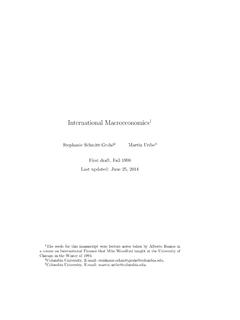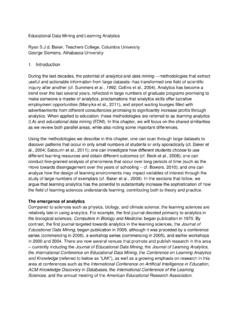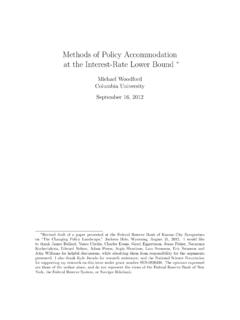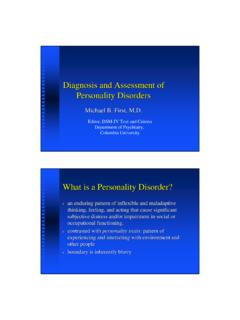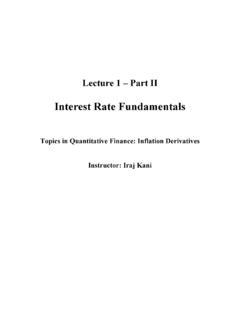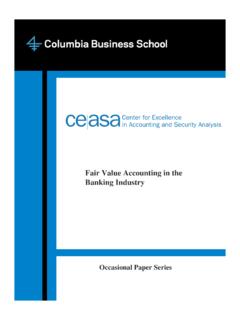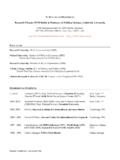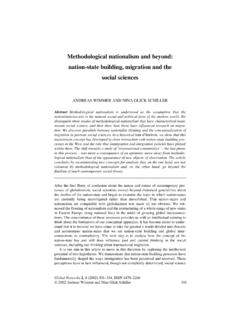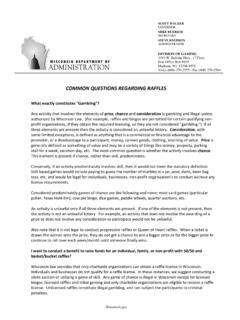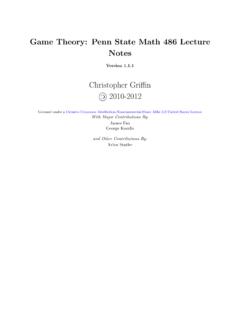Transcription of Expected Utility Theory - Columbia University
1 Expected Utility TheoryMark DeanGR5211 - Microeconomic Analysis 1 Introduction Up until now, we have thought of subjects choosing betweenobjects Used cars Hamburgers Monetary amounts However, often the outcome of the choices that we make arenot known You are deciding whether or not to buy a share in AIG You are deciding whether or not to put your student loan onblack at the roulette table You are deciding whether or not to buy a house that straddlesthe San Andreas fault line In each case you understand what it is that you are choosingbetween, but you don t know the outcome of that choice In fact, many things can happen, you just don t know whichoneRisk vs Uncertainty We are going to di erentiate between two di erent ways inwhich the future may not be know Horse races roulette wheels What is the di erence?
2 Risk vs Uncertainty When playing a roulette wheel the probabilities areknown Everyone agrees on the likelihood of black So we (the researcher) can treat this as something we canobserve Probabilities are objective This is a situation ofriskRisk vs Uncertainty When betting on a horse race the probabilities areunknown Di erent people may apply di erent probabilities to a horsewinning We cannot directly observe a person s beliefs Probabilities are subjective This is a situation ofuncertainty (or ambiguity)Choices Under Risk So, how should you make choices under risk?
3 Let s consider the following (very boring) fairground game You ip a coin If it comes down heads you get $10 If it comes down tails you get $0 What is the maximum amountxthat you would pay in orderto play this game?Approach 1: Expected Value You have the following two options1 Not play the game and get $0 for sure2 Play the game and get $xwith probability 50% and$10 xwith probability 50% Approach 1: Expected value The Expected amount that you would earn from playing thegame ( x) + (10 x) This is bigger than 0 ( x) + (10 x) 05 x Should pay at most $5 to play the gameThe St.
4 Petersburg Paradox This was basically the accepted approach until DanielBernoulli suggested the following modi cation of the game Flip a coin If it comes down heads you get $2 If tails, ip again If that coin comes down heads you get $4 If tails, ip again If that comes down heads, you get $8 Otherwise ip again and so on How much would you pay to play this game?The St. Petersburg Paradox The Expected value is12$2+14$4+18$8+116$16+..=$1+$1+$1+$1+. .= So you should pay an in nite amount of money to play thisgame Which is why this is the St. PetersburgparadoxThe St.
5 Petersburg Paradox So what is going wrong here? Consider the following example:ExampleSay a pauper nds a magic lottery ticket, that has a 50% chanceof $1 million and a 50% chance of nothing. A rich person o ers tobuy the ticket o him for $499,999 for sure. According to our Expected value method , the pauper should refuse the richperson s o er!The St. Petersburg Paradox It seems ridiculous (and irrational) that the pauper wouldreject the o er Why? Because the di erence in life outcomes between $0 and$499,999 is massive Get to eat, buy clothes, etc Whereas the di erence between $499,999 and $1,000,000 isrelatively small A third pair of silk pyjamas Thus, by keeping the lottery, the pauper risks losing an awfullot ($0 vs $499,999) against gaining relatively little ($499,999vs $1,000,000)Marginal Utility Bernoulli argued that people should be maximizing expectedutilitynot expectedvalue u(x)
6 Is the Expected Utility of an amountx Moreover, marginal Utility should bedecreasing The value of an additional dollar gets lower the more moneyyou have For exampleu($0) =0u($499,999) =10u($1,000,000) =16 Marginal Utility Under this scheme, the pauper should choose the rich person so er as long as12u($1,000,000) +12u($0)<u($499,999) Using the numbers on the previous slide, LHS=8, RHS=10 Pauper should accept the rich persons o er Bernoulli suggestedu(x) =ln(x) Also explains the St. Petersberg paradox Using this Utility function, should pay about $64 to play thegameRisk Aversion Notice that if people Maximize Expected Utility Have decreasing marginal Utility ( Utility is concave)
7 They will berisk averse Will always reject a lottery in favor of receiving its expectedvalue for sureRisk AversionExpected Utility Expected Utility Theory is the workhorse model of choiceunder risk Unfortunately, it is another model which has somethingunobservable The Utility of every possible outcome of a lottery So we have to gure out how to test it We have already gone through this process for the model of standard ( not Expected ) Utility maximization Is this enough for Expected Utility maximization?Data In order to answer this question we need to state what ourdata is We are going to take as our primitve preferences Not choices But we know how to go from choices to preferences, yes?
8 But preferences over what? In the beginning we had preferences over objects For temptation and self control we used menus Now lotteries !Lotteries What is a lottery? Like any lottery ticket, it gives you a probability of winning anumber of prizes Let s imagine there are four possible prizes a(pple),b(anana),c(elery),d(ragonfruit) Then a lottery is just a probability distribution over This is a lottery that gives 15% chance of winninga, 35%chance of winningb, 50% of winningcand 0% chance ofwinningdLotteries More generally, a lottery is anyp=0BB@papbpcpd1 CCA Such that px 0 xpx=1De nitionLetXbe some nite prize space, The set (X)of lotteries onXisthe set of all functionsp:X!
9 [0,1]such that x2Xp(x) =1 Expected Utility We say that preferences have anexpected utilityrepresentationif we can Find utilities onprizes (a),u(b),u(c),u(d) Such thatp qif and only ifpau(a) +pbu(b) +pcu(c) +pdu(d)>qau(a) +qbu(b) +qcu(c) +qdu(d) xpxu(x) xqxu(x) Expected UtilityDe nitionA preference relation on lotteries on some nite prize spaceXhave an Expected Utility representation if there exists a functionu:X!Rsuch thatp qif and only if x2Xp(x)u(x) x2Xq(x)u(x) Notice that preferences are on (X)but Utility numbers areonXExpected Utility What needs to be true about preferences for us to be able to nd an Expected Utility representation?
10 Hint: you know a partial answer to this Anexpected utilityrepresentation is still autilityrepresentation So preferences must be Complete Transitive Re exiveExpected Utility Unsurprisingly, this is not enough We need two further axioms1 The Independence Axiom2 The Archimedian AxiomThe Independence AxiomQuestion: Think of two di erent lotteries, forconcreteness, let s say thatpis a 25% chance ofwinning the apple and a 75% chance of winning thebanana, whileqis a 75% chance of winning theapple and a 25% chance of winning the banana. Sayyou prefer the lotterypto the lotteryq.
